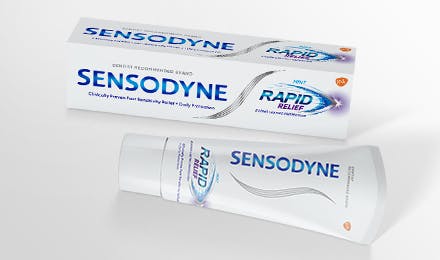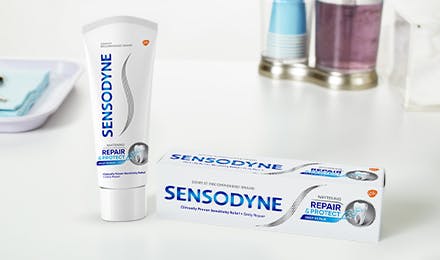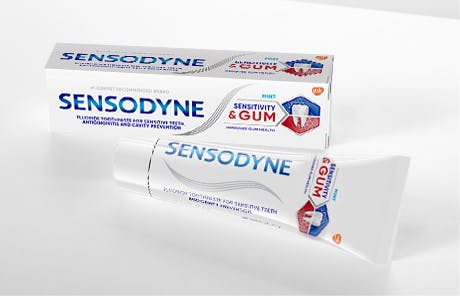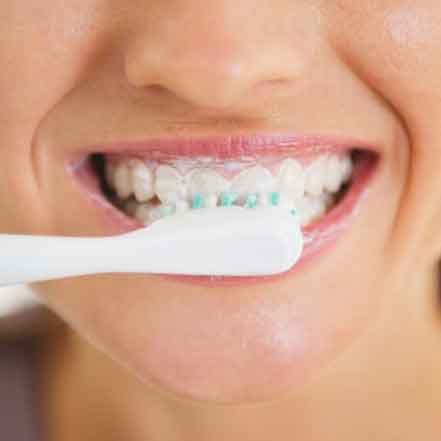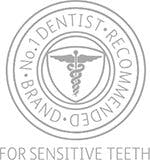Is Having Sensitive Teeth Normal?

Do your teeth hurt when you sip cold water or hot coffee? What about when there’s any pressure applied to your teeth? Do they feel sensitive?
Tooth sensitivity is pretty common, especially for people aged 20 to 40 (though it can affect people of all ages).1 If you have symptoms of pain ranging from a mild twinge to aching when your teeth are exposed to different temperatures or pressures, you can do something about it. And it’s time to answer that lingering question you may have — is it normal to have sensitive teeth?
What Is Tooth Sensitivity?
How do you identify tooth sensitivity? “Sensitivity in teeth occurs when the nerve of the tooth is exposed to stimuli,” said Dr. Nehi Ogbevoen, DDS and board-certified orthodontist at Barkate Nehi Orthodontics in Southern California. As mentioned above, tooth sensitivity is pain ranging from mild to severe. “Sensitive teeth are one of the most common concerns among patients visiting the dentist,” Dr. Ogbevoen said.
How Does Tooth Sensitivity Happen?
There can be several different causes of sensitive teeth. “This can be due to the wearing down or thinning of the tooth enamel [from dietary acid or brushing too hard, for example] or gum recession exposing underlying layers of teeth,” Dr. Ogbevoen explained. Bleaching teeth, gum disease, and a cracked tooth can all create sensitivity, too. “When the protective layers of the teeth have been compromised, stimuli such as heat, cold, and even sugar can trigger pain to the nerve of the tooth,” said Dr. Ogbevoen.
Is Tooth Sensitivity a Bad Thing?
So you’re probably wondering, “Is this tooth sensitivity a bad thing?” Not necessarily! “Sensitivity does not necessarily mean you have unhealthy teeth,” Dr. Ogbevoen said. “However, if the sensitivity is affecting daily activities such as eating, drinking, or talking, it is best to visit your dental health professional.” A dentist can recommend treatments or procedures that can be done to help tooth sensitivity.
How Can You Treat Sensitive Teeth?
If you have sensitive teeth, you should visit your dental health professional first. “It’s best to seek advice and an examination from a dental professional,” Dr. Ogbevoen explained. “A thorough examination will identify any cracks, holes, or cavities in your teeth and gum recession.” He went on to say that your dentist will most likely recommend a sensitivity toothpaste, like Sensodyne, to provide sensitivity relief.
Sensodyne Rapid Relief Mint toothpaste provides proven pain relief in three days with twice-daily brushing. It’s the No. 1 dentist-recommended brand. Its unique formulation with stannous fluoride acts to quickly create a barrier over sensitive areas of your teeth, building increasing protection against painful sensitivity of the teeth to cold, heat, acids sweets or contact.*
*With twice-daily brushing
Good Oral Hygiene Tips for Tooth Sensitivity
Here are some other ways for practicing good oral hygiene that can help your sensitive teeth. Wait at least an hour after eating or drinking before you brush your teeth, as some foods and drinks can soften your enamel.1 Try to change out your toothbrush every two to three months, or sooner if your toothbrush is worn out.1 It can also help to limit the number of sugary foods or acidic drinks you have in a day.1
Tooth sensitivity isn’t always a bad thing, but it still helps to take a trip to your dental health professional’s office and find out what’s causing it. Get more tips on managing sensitive teeth from Sensodyne.
Source Citations
- Sensitive teeth. Oral Health Foundation. https://www.dentalhealth.org/sensitive-teeth Accessed 6/2/2023.


